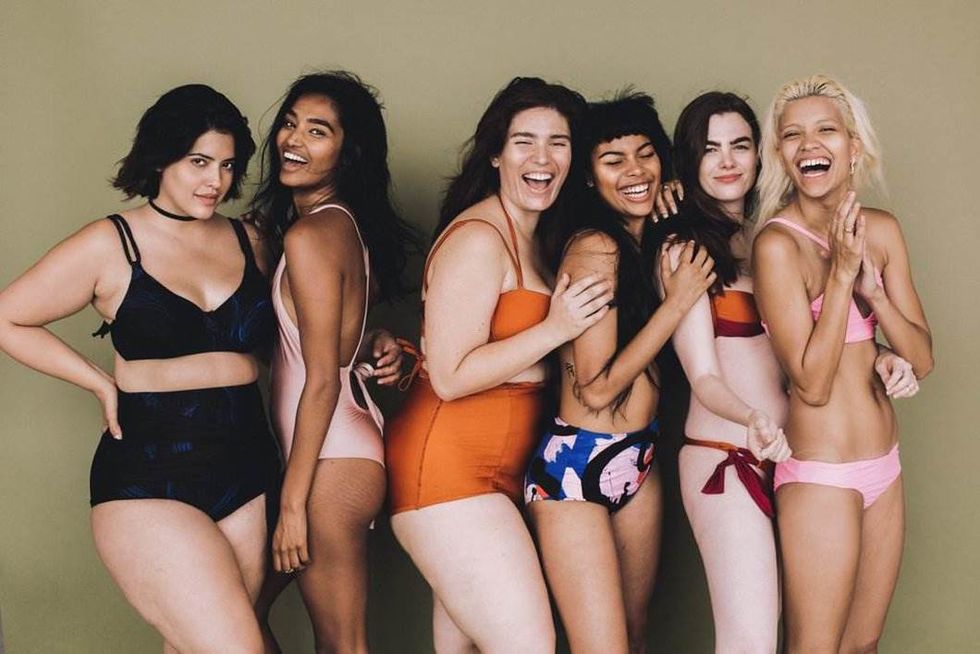A fellow Odyssey creator recently wrote an article entitled, "Body Positivity Is Great And All But Not When It's Ignoring Health Concerns." In her article, she discusses ways in which the Body Positivity Movement glorifies obesity while "...giving the finger towards health!" As a healthy, plus-size woman, I had a few opinions after reading her article.
The Body Positivity Movement was started to encourage women to be accepting of their bodies, no matter their shape or size. I don't think the movement is "fighting for the crown of attractiveness," but instead it's telling women to look passed societal beauty standards by accepting and loving their body no matter what it looks like. The whole point of the movement is to not focus on society's opinions.
I also don't agree that the movement is promoting a sedentary lifestyle. Plus-size fitness bloggers like Jessamyn Stanley, Dana Falsetti, Dianna Bondy, and so many more all advocate for loving your body while exercising and eating right. While Tessa Holiday may not a good representation for the movement's entire message, she is simply one plus-size, body positive advocate.
There is no line between confidence and obesity. While obesity should never be encouraged, we should be encouraging these women to love the skin they are in while at the same time encouraging them to improve their health. As Linda Bacon writes in "Healthy at Every Size: The Surprising Truth About Your Weight,"research has shown that people that are considered overweight go on to lead long healthy lives, while many people at "normal," weights struggle with diseases that are often associated with excess weight.
The author of "Body Positivity Is Great And All But Not When It's Ignoring Health Concerns" mentions that we have to stop associating skinny with healthy. I completely agree, but I also believe we have to stop associating fat with unhealthy. As aforementioned, a person can be fat while also being healthy. Advocates of the movement are not normalizing obesity! No one is normalizing obesity! We are simply trying to teach young women, and even older women, that it is OK to love your body even if society tells you you shouldn't.
Now let's move on to fat-shaming. Fat-shaming is defined as the action or practice of humiliating someone judged to be fat or overweight by making mocking or critical comments about their size. In my opinion, "Body Positivity Is Great And All But Not When It's Ignoring Health Concerns" is doing just that. By assuming that all fat people are unhealthy, or don't exercise, she is making critical comments about people's size. As she mentions in her article, "...let’s leave it to the doctors and medical professionals to criticize." How does she expect us to believe that loving yourself will lead to loving others when she's telling us that we shouldn't love our bodies after a certain weight?
Being fit has different connotations depending on who you ask. So, how can we ever really know what defines being fit? Is it climbing five flights of stairs without being short of breath or running a marathon in record time? Without some type medical degree and an extensive health history how can you know who is or isn't fit? Thanks to modern medicine and regular health exams, people know what they need to work on to improve their own health.
She also mentions that "...confidence and this self-love talk [are] going to people's heads." I absolutely agree. A study conducted at Florida State University has recently shown that seeing plus-size women represented in the fashion industry has lead to an increase in women's overall mental health. When shown thin models women were more likely to compare their own bodies to those of the models, which ultimately lead to worse psychological health and less body satisfaction. However, when shown plus-size models, the participants said they felt better about their own bodies. Unhealthily skinny models often lead young women to develop horrible self-images which can spiral into eating disorders. However, when we show young women that it is okay to love the skin you're in, we show them the true definition of self-acceptance and self-love.
Being a woman in the 21st century is incredibly challenging, but being a plus-size woman in the 21st century brings about a whole new set of challenges. One very big challenge faced by the plus-size community is the availability of plus-size activewear. I know what you're wearing shouldn't affect your exercise regime, but it can be extremely discouraging as a plus-size woman to walk into the gym wearing an old t-shirt and plain black leggings and see skinny women wearing super cute, styling workout gear. It's hard enough going to a public gym as a plus-size woman, feeling like people are constantly judging and staring at you, and not feeling confident in what you're wearing makes it even harder.
SEE ALSO:"25 Struggles Only Plus-Size Women Can Relate To."
I've been big pretty much my whole life. Weighing a whopping 9 lbs and 15 oz at birth, I was never what you'd call "small." However, despite my weight, I've never struggled with any major health conditions. I've played sports my whole life, from little league to varsity volleyball, I've always tried to stay active. But even still, I've never been as small as the rest of my peers. I've always been the "big girl," "the fat friend," "thick," "fat," whatever you want to call it. Yet here I am, healthy and happy, even as a size 20, and I think I owe a lot of my happiness and self-acceptance to the Body Positivity Movement. Had I continued to be exposed to women with unrealistic body types, my life may have taken a different course. At the end of the day, your body is just that - your body. Don't let other people tell you what you can and can't do with it!
















